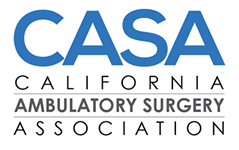Why Choose an ASC
Patient Resources
Ambulatory surgery centers (ASCs) focus on providing same-day surgical care, including diagnostic and preventative procedures that were once performed exclusively in hospitals. ASCs offer high-quality, patient-centered facilities and significant cost savings for our patients while producing outstanding health outcomes and high patient satisfaction.
We know that when it comes to safety and quality, our patients come first. ASCs have an excellent track record of patient safety – in the past five years alone, more than 100 million Americans have had successful outpatient surgery in an ASC.
What is an ASC?
Ambulatory surgery centers (ASCs) are modern healthcare facilities focused on providing same-day surgical care, including diagnostic and preventive procedures.
There are more than 750 ASCs in California – they offer safe, well-equipped facilities for specific surgical procedures by highly trained, specialized physicians. ASCs are designed for efficiency, patient satisfaction, and excellent health outcomes. Healthcare professionals in ASCs are trained with the same criteria as those who work in hospitals.
Are ASCs safe?
Data and quality reporting show that incidences of unplanned or adverse events that occur in ASCs is extremely low. ASCs also report quality metrics equal to or better than other sites of care, including hospitals.
There are two ASC quality reporting programs that make their results accessible publicly online: Medicare’s Ambulatory Surgical Center Quality Reporting (ASCQR) Program and a program coordinated by the ASC Quality Collaboration (ASC QC). Both of these reporting programs focus on transparent data to showcase ASC healthcare quality and safety.
How are ASCs regulated?
California ASCs are regulated by several rigorous processes, including Medicare certification, California state licensure, and accreditation. All ASCs accepting Medicare patients are overseen by the CA Department of Healthcare Services (DHCS) through CDPH’s contract with the federal government. The majority of ASCs are under the regulatory oversight of the Medical Board of California (MBC), which requires that ASCs be nationally accredited by an accrediting agency approved by the MBC. These are the same organizations that accredit hospitals and doctors’ offices with rigorous standards similar to Medicare. For example, an ASC that is both accredited and Medicare-certified would have oversight by both CDPH and the MBC.
For information regarding oversight of the MBC please go to the following link.
Are all patients good candidates for ASCs?
ASCs are not an appropriate option for every patient, which is why physicians first conduct an assessment to determine a patient’s health and risk factors, along with an evaluation of the type of surgical procedure that is needed. Higher-risk patients are sent to a hospital setting rather than an ASC.
ASCs only offer a small number of specialized surgical procedures that can be done on an outpatient basis without an overnight hospital stay. This allows physicians to design an environment that is optimized for those specific procedures and results in greater efficiency and more tailored patient care.
What are the benefits of going to an ASC for my procedure instead of a hospital?
ASCs offer much greater levels of convenience and accessibility to patients. ASCs include fully-equipped operating and recovery rooms under the care of skilled medical professionals, but they are smaller clinical settings. This translates to more efficiency, more predictable schedules, and shorter stays for patients.
Unlike hospitals where scheduling can be interrupted due to emergencies, ASCs can better control patient flow, reduce wait times, and enhance patient-doctor interaction.


